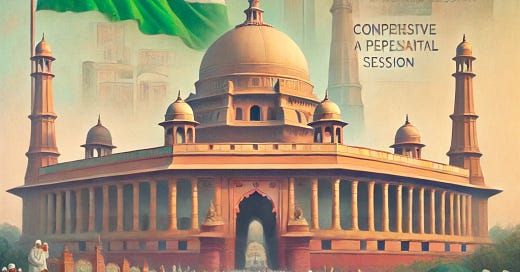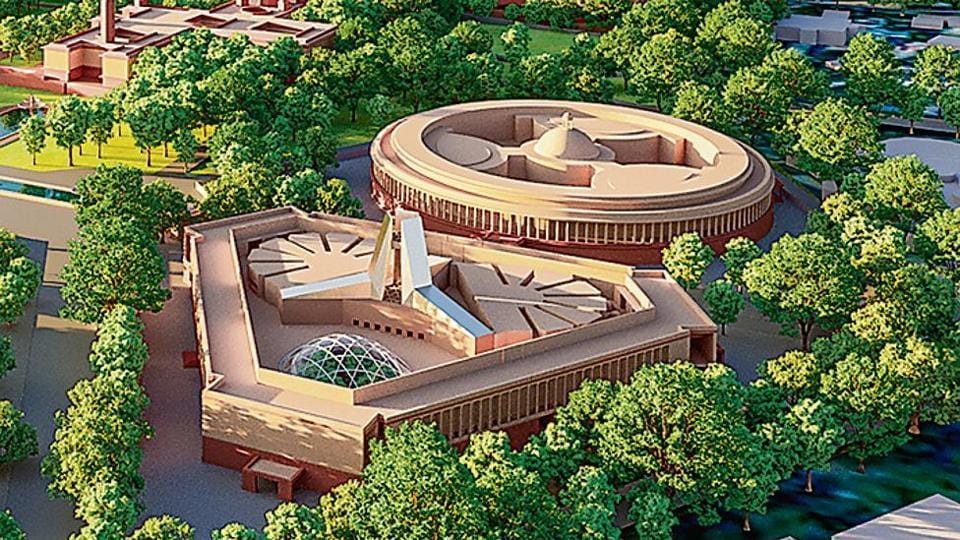The Waqf (Amendment) Bill, 2024: A Legislative Flashpoint in the Winter Session
Salient features of the Bill that proposes to comprehensively amend the Waqf Act, 1995: By consulting a broader range of stakeholders, the JPC can provide fresh insights and useful suggestions.
The Waqf (Amendment) Bill, 2024: A Legislative Flashpoint in the Winter Session
The Waqf (Amendment) Bill, 2024 has emerged as a contentious centerpiece of the ongoing Winter Session of the Indian Parliament, which began yesterday (November 25) and is set to conclude on December 20, 2024. Introduced in the Lok Sabha by Union Minority Affairs Minister Kiren Rijiju on August 8, 2024 during the Monsoon Session, the bill proposes sweeping changes to the Waqf Act, 1995, last amended in 2013. Among its 40 proposed amendments, the bill seeks to curtail the broad powers of Waqf Boards, particularly their authority to summarily declare properties as Waqf properties—a process often criticized as arbitrary and draconian. Though the government had referred the bill to a Joint Parliamentary Committee (JPC) for further scrutiny, signaling a willingness to seek broader consensus, the contentious nature of the reforms has sparked vigorous debate and widespread opposition.
JPC Under Scrutiny: Leadership, Controversies, and Allegations
The Joint Parliamentary Committee (JPC), chaired by Jagdambika Pal of the BJP—who notably holds the dubious distinction of serving as Chief Minister of Uttar Pradesh for a single day in February 1998—has convened 27 meetings to deliberate on the Waqf (Amendment) Bill, 2024, and is expected to submit its report by November 29, 2024. However, the opposition has strongly criticized the committee’s handling of the review process, labeling it as “bulldozing” and pointing to procedural lapses, inadequate consultations with stakeholders, and the exclusion of key witnesses, including state government representatives.
Adding to the controversy, opposition members allege that the JPC’s recent tour of Karnataka lacked quorum, further questioning the legitimacy of its findings. They have also raised concerns about the inclusion of testimonies from individuals with no direct connection to Waqf issues, which they argue dilutes the credibility of the deliberative process. Despite these challenges, the government remains steadfast in its intent to table the bill during the current session. Meanwhile, opposition MPs have formally appealed to Lok Sabha Speaker Om Birla for an extension of the committee's tenure, insisting on the need for a more thorough review.
AIMPLB and Stakeholder Concerns
The All India Muslim Personal Law Board (AIMPLB) has strongly criticized the proposed amendments, accusing the government of attempting to "usurp" Waqf properties and compromise the autonomy of Waqf institutions across the country. The amendments, they argue, risk disrupting the delicate balance between state oversight and community-managed religious endowments. With millions of Indians directly or indirectly affected by the governance of Waqf properties, the bill’s potential impact has ignited sharp reactions from community leaders, activists, and opposition members alike. As Parliament braces for intense debates, the bill remains a legislative flashpoint, testing the government’s ability to reconcile its policy objectives with public and political dissent.
Key Amendments to the Waqf Act
Redefinition of 'Waqf'
Section 3(r) of the Bill redefines "Waqf" as the permanent dedication by any Muslim, practising Islam for at least five years, of any movable or immovable property for purposes recognised by Muslim law as pious, religious, or charitable.
Section 3(r)(iv) expands on Waqf-alal-aulad, ensuring that income from such waqf, when the line of succession fails, is used for education, development, and welfare, including the maintenance of widows, divorced women, and orphans as prescribed by the Central Government.
Introduction of Collector Role
Section 3(da) introduces the position of the Collector, who will assume powers previously vested in the Auqaf Board.
Regulation of Waqf Properties— Detailed Provisions of New Sections 3A, 3B, and 3C
Section 3A: Creation of Waqf and Protection of Inheritance Rights
Section 3A establishes specific conditions for the lawful creation of a waqf. It mandates that no person can create a waqf unless they are the lawful owner of the property and possess the competence to transfer or dedicate such property. Additionally, the creation of a waqf-alal-aulad, which is a waqf for the family of the donor, must not result in the denial of inheritance rights to the heirs, including women heirs, of the waqif (the person making the dedication). This provision ensures that the rights of all heirs are protected and that the creation of waqf-alal-aulad does not circumvent inheritance laws, a practice that has been a source of heartache among natural heirs and has led to protracted litigation.
Section 3B: Mandatory Filing of Waqf Details
Section 3B requires that every waqf registered under the Act, prior to the commencement of the Waqf (Amendment) Act, 2024, must file detailed information about the waqf and its properties on a designated portal and database within six months of the commencement of the Act. The required details include the identification and boundaries of waqf properties, their use, and current occupiers. It also includes the name and address of the waqf creator, the mode and date of creation, and, if available, the waqf deed. Additionally, information about the present mutawalli (custodian) and management, gross annual income from waqf properties, annual taxes and expenses, amounts allocated for salaries, religious and charitable purposes, court cases involving the waqf property, and any other details prescribed by the Central Government must be provided.
This comprehensive filing requirement aims to prepare a detailed inventory of waqf properties, preventing new and frivolous claims regarding old waqfs. More importantly, it shall eliminate the possibility of the Waqf Boards, whether through the connivance of their employees or otherwise, from striking out such properties from their registers and collusively and illegally allowing the land mafia to usurp them.
Section 3C: Handling Government Property Identified as Waqf
Section 3C addresses the issue of government properties mistakenly identified or declared as waqf properties. It stipulates that any such government property, whether identified before or after the commencement of the Act, shall not be considered waqf property. In cases of dispute regarding the ownership of such property, the matter is to be referred to the jurisdictional Collector, who will conduct an inquiry and determine whether the property is indeed government property. Until the Collector submits their report, the property in question will not be treated as waqf property. If the Collector determines the property is government-owned, necessary corrections will be made in the revenue records, and a report will be submitted to the State Government, which will then instruct the Waqf Board to make the appropriate corrections in their records. This section aims to prevent the wrongful appropriation of government property as waqf, ensuring proper classification and record-keeping.
Evacuee Property Wrongly Declared as Waqf Property
In states like Punjab, Haryana, and even Uttar Pradesh, properties vested in the Central Government under the Administration of Evacuee Property Act, 1950, and the Displaced Persons (Compensation and Rehabilitation) Act, 1954, were often misclassified as waqf property. These properties, initially intended for allotment to displaced persons, have remained entangled in administrative errors, because the previous legal framework worked on the principle that “once a waqf property, always a waqf property”. The new provision, though seemingly stringent, will allow the Central Government to retrieve these urban and rural properties and rightfully allot them to displaced persons. Despite having verified claims, these individuals— or their legal hers— have been running from pillar to post for 77 years since Partition. This measure aims to correct past misclassifications, ensuring that those affected by the Partition finally receive the compensation and rehabilitation that was rightfully due to them. This thus a very welcome provision at least from the perspective of Punjab and Haryana.
Changes in Survey and Publication
The Bill replaces the Survey Commissioner with the Collector for conducting waqf surveys (Section 4). It also mandates a 90-day public notice period before updating land records to allow for objections (Section 5). This change aims to make the survey of waqf properties both efficient and effective. Unlike the Survey Commissioner, who, despite being appointed by the State Government, did not have control over land revenue administration, the Collector can now oversee these quasi-judicial functions, addressing a significant shortcoming.
Tribunal Decisions and Dispute Resolution
Under the amended Section 6, disputes over waqf properties are adjudicated by a Tribunal comprising members from the State Judicial Service, State Civil Services, and experts in Muslim law. The amendment extends the period to challenge Tribunal decisions from one to two years and allows late applications for valid reasons. Section 40, allowing the Waqf Board to collect information on potential waqf properties, is omitted. The latter statutory power was grossly abused by the lower functionaries of the Waqf Board to run virtual extortion rackets concerning disputed properties with some semblance of Muslim rights. This was due to the draconian powers under the existing law to declare waqf properties through an ultra-summary procedure, with little scope for statutory appeals.
Constitution of Board and Council
The composition of the Central Waqf Council (Section 9) and Board of Auqaf (Section 14) now includes mandatory representation of women and non-Muslims, aiming for more inclusivity and diversity.
Registration and Audit of Auqaf
Section 36 now requires a waqf deed for registration and mandates the Collector to verify the application’s genuineness. Disputed properties will not be registered without court resolution.
Section 47 revises the audit process, stipulating that auditors must be from a state-prepared panel. The Central Government can also direct audits by the Comptroller and Auditor-General of India and publish audit reports.
Statement of Objects and Reasons
The Bill aims to address inefficiencies in the administration of auqaf, as identified by the Sachar Committee and other reports. It seeks to enhance transparency, accountability, and the equitable distribution of waqf benefits.
Parliamentary Debate in the Monsoon Session
Opposition Concerns
Opposition members had raised concerns about federalism, legislative competence, and the infringement of religious freedoms. They argued that including non-Muslim members in the Waqf Council and Board violates the secular principles protected under Articles 25 and 26 of the Indian Constitution.
MP K.C. Venugopal criticised the Bill for attacking the Constitution's secular fabric and infringing on religious freedoms by including non-Muslims in waqf administration. Similar concerns were echoed by MPs Kanimozhi Karunanidhi and E.T. Mohammed Basheer, who also highlighted potential violations of Article 30, which empowers minorities to manage their institutions.
Federalism and Legislative Competence
Opposition members, including MP Supriya Sule, pointed out that land and waqf properties fall under the State List in Schedule VII of the Constitution. They argued that centralising control over waqf administration undermines federal principles. She, however, seems to have missed the point that the 1995 enactment, which is now being amended, is a central law. Moreover, the quasi-judicial authority of the "Collector," introduced for better administration of the Waqfs, is a responsible member of the IAS who works under the supervision and control of the concerned state government.
Government's Defence
Minority Affairs Minister Kiren Rijiju, who had introduced the bill, defended the Bill, citing its alignment with the Sachar Committee's recommendations. He asserted that the Bill does not infringe on religious freedoms and falls within the legislative competence under the Concurrent List’s Entries 10 and 28.
Rijiju referenced the 1976 Waqf Inquiry Report, highlighting issues with current waqf property management, including the concentration of benefits among mutawallis. He justified the amendments as necessary for transparency and efficient dispute resolution, noting the high number of pending cases before Waqf Tribunals.
Summing Up: Ensuring Effective and Inclusive Waqf Administration
The Waqf (Amendment) Bill, 2024, aims to introduce significant changes to the administration of waqf properties, focusing on enhancing transparency and inclusivity. The government argues that these amendments are crucial for effective governance, while the Opposition highlights constitutional concerns, stressing the importance of further scrutiny by the Joint Parliamentary Committee (JPC). This Bill, proposing around 40 amendments, represents a bold initiative by the Central Government to reform the functioning of both Central and State Waqf Boards, which have often been criticized for perpetuating land mafias, especially in urban areas.
A Reformative Measure, Not an Anti-Muslim Instrument
It is important to view this Bill not as an anti-Muslim measure, but as a call for informed debate in both in the JPC and the public domain regarding the proposed provisions. The effective implementation of these amendments, if enacted, is crucial to ensure they do not foster a sense of discrimination against the waqfs or the broader Muslim community. The reformed law should be seen as an opportunity to create an enabling environment for poor and needy Muslim citizens to benefit from waqfs, which are fundamentally charitable institutions.
Consultation and the Way Forward
The JPC Report: Concerns, Perceptions, and the Case for Prudence
The Joint Parliamentary Committee (JPC), tasked with reviewing the Waqf (Amendment) Bill, 2024, too finds itself at the center of controversy as it rushes to meet its deadline of November 29, 2024. While the government’s resolve to table the bill during the ongoing Winter Session is clear, the hurried pace of the JPC’s deliberations and its anticipated report risks deepening the already widespread perception that this contentious legislation is being pushed through without adequate scrutiny. Many within the Muslim community see this bill as an attempt to weaken apex Waqf institutions, which play a central role in managing charitable activities by and for Muslims. This sentiment is compounded by a long-standing critique of Waqf Boards, where allegations of corruption and the influence of land mafias overshadow any tangible benefits provided to ordinary Muslims across the country.
Hasten Slowly
That said, while charity can be organized through alternative legal structures, the government must recognize the cultural and institutional importance of Waqf properties for the Muslim community. Rushing through this bill with a hastily prepared JPC report risks further alienating stakeholders, undermining the very objective of meaningful reform. It would therefore be prudent for the Lok Sabha Speaker to extend the JPC’s tenure, allowing for broader consultations and the incorporation of diverse perspectives. Bringing this bill in the forthcoming Budget Session would not only demonstrate the government’s commitment to transparency but also provide an opportunity for more balanced and informed legislation.
JPC Recommendations Not Binding
It is also worth noting that the JPC’s recommendations, whether with or without dissenting notes, are not binding on the government or Parliament. The central government retains full liberty to accept, reject, or amend the report in whole or in part and may even introduce official amendments beyond the JPC’s suggestions. The essence of such parliamentary scrutiny lies in ensuring that the final legislation reflects a judicious balance of diverse views and interests. By consulting a broader range of stakeholders, the JPC can provide fresh insights and useful suggestions, fostering trust in the legislative process.
Waqf Reform is Long Overdue
As this process unfolds, it is crucial to recognize that careful deliberation, rather than haste, lays the foundation for robust and sustainable policy outcomes. Shakespeare’s timeless words, "Wisely and slow; they stumble that run fast" (Romeo and Juliet, Act 2, Scene 3), serve as a poignant reminder that rushing through critical decisions often leads to errors and missed opportunities. This wisdom resonates deeply with the legislative process surrounding the Waqf (Amendment) Bill, 2024, highlighting the importance of prudence and thoughtful engagement to ensure the bill’s success and acceptance, even as we are firmly of the opinion that the 1995 Waqf law needs comprehensive reform.
Modern Muslim Philanthropy in India: Moving Beyond Traditional Waqf Structures
Modern Muslim Philanthropy: Embracing Flexible and Inclusive Structures
The Waqf Act, 1995 Deserves a Decent Burial—in the Current Session of the Parliament
1. Introduction: The Genesis of the Debate via Private Member's Bill









There is no doubt that the Waqf Act has been a drain on the legitimate resources of the country and its citizens. So called secular political parties used it to mobilize and retain the political support needed to win elections.
For BJP and Modi it is a litmus test. They would never bring this bill if they got 400+ in LS elections. They know that their voter wants results and cannot be taken for granted. Voter standing firmly with Modi in Haryana and Maharashtra's key elections is possibly a last chance for Modi and BJP to stick to its agenda and ensure that no party appeases one group to win votes. If they drop the Waqf bill this time, then God save BJP. BJP voters know that when it comes to internal governance Modi govt is weak. It's time to stand up and show strength and commitment.